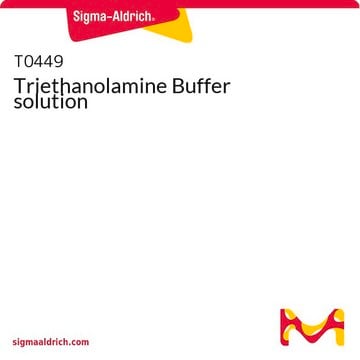MAK105
Phosphoglucomutase Colorimetric Assay Kit
sufficient for 100 colorimetric tests
Sign Into View Organizational & Contract Pricing
All Photos(3)
About This Item
UNSPSC Code:
12352200
NACRES:
NA.84
Recommended Products
usage
sufficient for 100 colorimetric tests
detection method
colorimetric
storage temp.
−20°C
General description
Phosphoglucomutase (PGM) is an enzyme crucial for the interconversion of glucose-1-phosphate and glucose-6-phosphate. In glycogenolysis, PGM converts glucose-1-phosphate into glucose-6-phosphate for use in either the glycolytic pathway or pentose phosphate pathway. When blood glucose levels are high, PGM will convert excess glucose-6-phosphate (formed from glucose by the action of hexokinase) to glucose-1-phosphate.
Deficiency of phosphoglucomutase leads to glycogen storage disease.
Deficiency of phosphoglucomutase leads to glycogen storage disease.
Suitability
Suitable for the measurement of phosphoglucomutase activity, analysis of glucose metabolism and cell signaling and screening anti-diabetic drugs in animal tissues (muscle, liver, heart, kidney etc.), cell culture (adherent or suspension cells) and plasma.
Principle
The Phosphoglucomutase Colorimetric Assay kit provides a simple and direct procedure for measuring PGM activity in a variety of samples. PGM activity is determined by a coupled enzyme assay in which glucose-1-phosphate is converted by PGM to glucose-6-phosphate. Glucose-6-phosphate is subsequently oxidized to form a product, which reacts with a probe generating a colorimetric (450 nm) product proportional to the PGM activity present. One unit of PGM is the amount of enzyme that will generate 1.0 μmole of NADH per minute at pH 8.0 at room temperature.
Signal Word
Danger
Hazard Statements
Precautionary Statements
Hazard Classifications
Resp. Sens. 1
Storage Class Code
10 - Combustible liquids
Certificates of Analysis (COA)
Search for Certificates of Analysis (COA) by entering the products Lot/Batch Number. Lot and Batch Numbers can be found on a product’s label following the words ‘Lot’ or ‘Batch’.
Already Own This Product?
Find documentation for the products that you have recently purchased in the Document Library.
Liver glucose metabolism in humans.
Adeva-Andany M M, et al.
Bioscience Reports, BSR20160385-BSR20160385 (2016)
Phosphoglucomutase (PGM 1) deficiency: a novel defect of muscle glycogen degradation and synthesis (P07. 200).
Haller R, et al.
Neurology, 78(1), P07-200 (2012)
Feher J J
Quantitative Human Physiology, 1008-1008 (2017)
The enzyme phosphoglucomutase (Pgm) is required by Salmonella enterica serovar Typhimurium for O-antigen production, resistance to antimicrobial peptides and in vivo fitness.
Paterson G K< et al.
Microbiology, 155(10), 3403-3410 (2009)
Jessica N R Peoples et al.
The Journal of biological chemistry, 293(18), 6925-6941 (2018-03-16)
Cardiac energy demands during early embryonic periods are sufficiently met through glycolysis, but as development proceeds, the oxidative phosphorylation in mitochondria becomes increasingly vital. Adrenergic hormones are known to stimulate metabolism in adult mammals and are essential for embryonic development
Our team of scientists has experience in all areas of research including Life Science, Material Science, Chemical Synthesis, Chromatography, Analytical and many others.
Contact Technical Service







